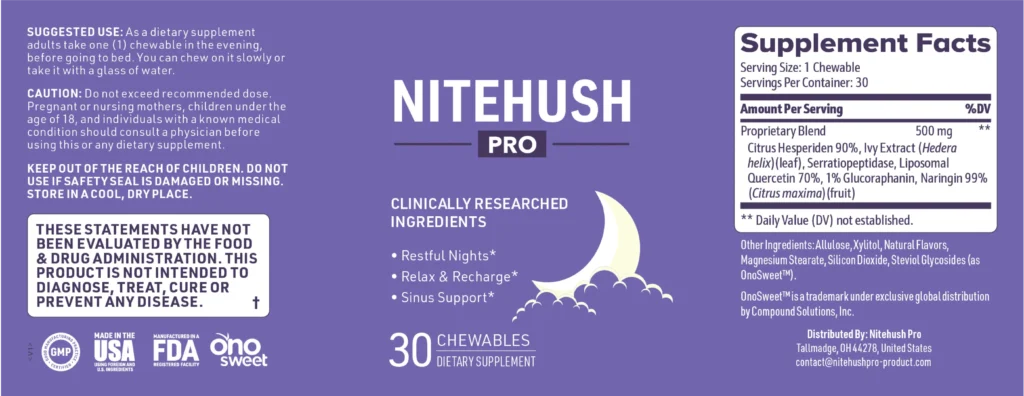The Harmful Effects of Poor Sleep: What Sleep Deprivation Is Doing to Your Health
Do you wake up feeling tired, even after spending hours in bed? Struggle to fall asleep or wake up several times during the night? If so, you’re not alone. Insomnia and sleep disorders affect millions of people around the world — and the consequences go far beyond just feeling drowsy.
Poor sleep is not just inconvenient. It’s a serious health issue that affects both your body and your mind, contributing to physical illnesses, emotional imbalances, and even reduced productivity.
In this article, we’ll explore the real health risks of sleep deprivation, explain how lack of rest impacts your well-being, and present safe and natural solutions to improve your sleep — including the use of dietary supplements like NiteHush Pro, which is specially formulated to support deep and restorative sleep.
Why Is Sleep So Important?
While we sleep, our bodies perform vital functions, such as:
- Cellular regeneration
- Hormone production (including melatonin and growth hormone)
- Immune system strengthening
- Memory consolidation
- Emotional and mental regulation
In other words, sleep is when the body recovers from daily stress and prepares for the next day. When this process is disrupted — due to poor sleep quality or not enough hours — the body suffers the consequences.
The Harmful Effects of Poor Sleep
1. Weakened immune system
Lack of sleep reduces the production of immune cells. People who suffer from insomnia are more likely to catch infections, colds, and suffer from inflammation or allergies.
2. Trouble concentrating and memory loss
Sleep deprivation impairs the hippocampus, the part of the brain responsible for memory. It also prevents the brain from consolidating what was learned during the day, affecting work and academic performance.
3. Increased anxiety and irritability
Without proper rest, the brain lowers its production of serotonin and dopamine. This leads to higher stress levels, mood swings, difficulty dealing with daily problems, and even symptoms of depression.
4. Weight gain and appetite imbalance
Poor sleep throws off the hormones that regulate hunger. Ghrelin (which increases appetite) goes up, while leptin (which signals fullness) goes down — leading to food cravings, especially for sugar and carbs.
5. Cardiovascular problems
Research shows that sleep deprivation increases the risk of high blood pressure, heart attacks, and strokes. The heart works overtime to keep the body going without rest.
6. Increased risk of type 2 diabetes
Lack of sleep affects insulin sensitivity and glucose metabolism, increasing the risk of developing type 2 diabetes over time.
7. Accelerated aging
During sleep, the body produces collagen and activates antioxidant processes. When sleep is insufficient, signs of aging like dark circles, wrinkles, and sagging skin appear more quickly.
8. Lower productivity
Chronic fatigue, brain fog, poor memory, and lack of focus directly affect your ability to work, make decisions, and stay motivated — which can lead to financial and emotional stress.
Signs You’re Not Sleeping Well
- Trouble falling or staying asleep
- Feeling tired even after a full night’s sleep
- Moodiness and irritability
- Frequent headaches
- Low motivation
- Daytime sleepiness
- Cravings for sugar or caffeine
If you recognize these symptoms, it’s time to make real changes to improve your sleep.

What Can You Do to Sleep Better?
The good news is that there are effective and natural ways to sleep better. Here are some proven strategies:
1. Keep a regular sleep schedule
Go to bed and wake up at the same time every day — even on weekends. This helps your body regulate its internal clock.
2. Optimize your bedroom
Make your sleep environment dark, quiet, and cool. Use blackout curtains and earplugs if needed.
3. Avoid stimulants at night
Cut back on caffeine, alcohol, nicotine, and screen time at least one hour before bed.
4. Practice relaxation techniques
Deep breathing, guided meditation, or a warm bath can help calm your mind and body before sleep.
5. Try natural sleep supplements
For people who struggle to relax or stay asleep, natural supplements can be a safe and effective solution. Look for formulas that include:
-
Melatonin
-
Chamomile
-
Passionflower
-
Hops
-
Magnesium
One example of a well-rounded solution is NiteHush Pro — a dietary supplement made with calming ingredients to support deep and uninterrupted sleep. It helps the nervous system relax, so your body can naturally enter the most restorative phases of sleep — without creating dependence or grogginess the next day.
Better Sleep Is Self-Care
Sleep is just as important as healthy eating and regular exercise. Ignoring insomnia or trying to “push through” poor sleep puts your physical and mental health at risk.
If your sleep isn’t as restful as it should be — or if you constantly wake up feeling drained — don’t ignore the warning signs. Building healthy habits, improving your routine, and exploring natural alternatives like high-quality supplements can completely transform your quality of life.
Sleep better. Live better.
Have You Tried NiteHush Pro? Share Your Experience!
If you’ve already tried NiteHush Pro or know someone who has, leave a comment below sharing your experience! Your feedback could help others who are looking for natural ways to improve their sleep and overall well-being.



